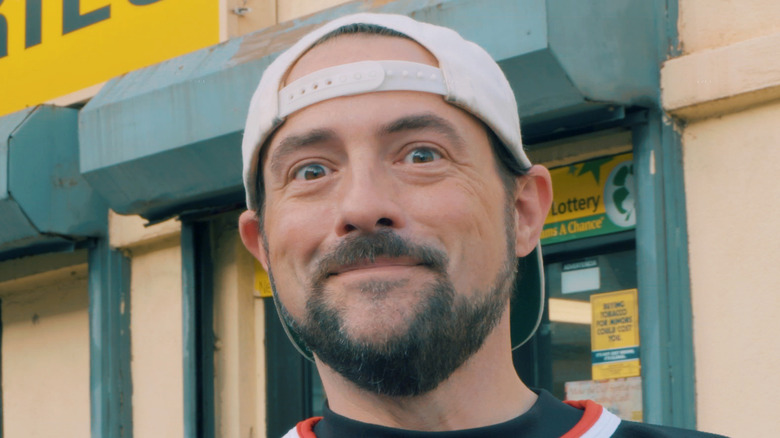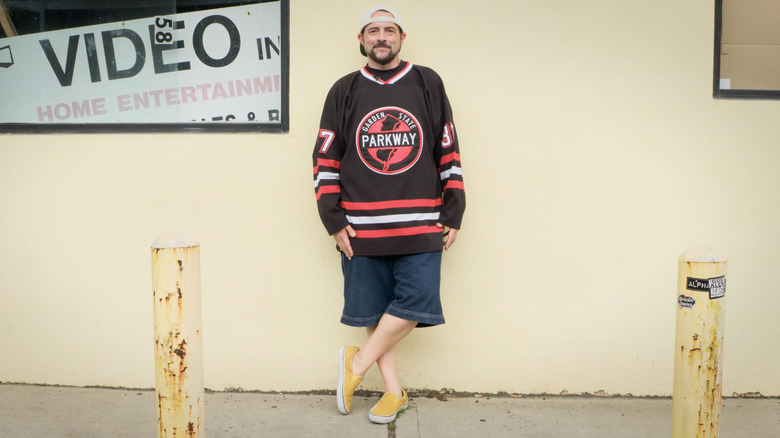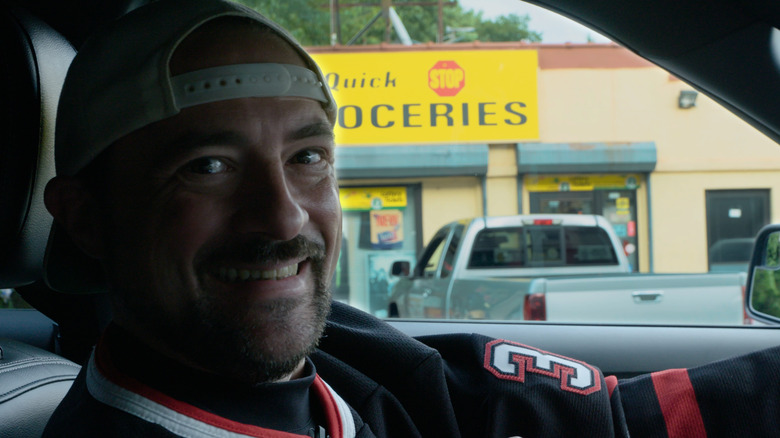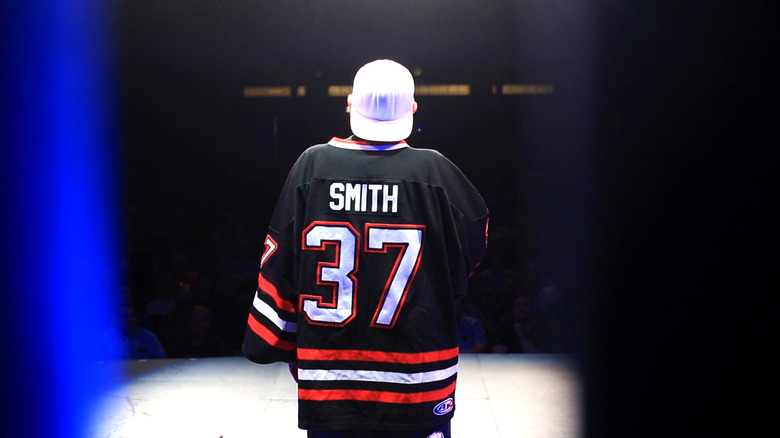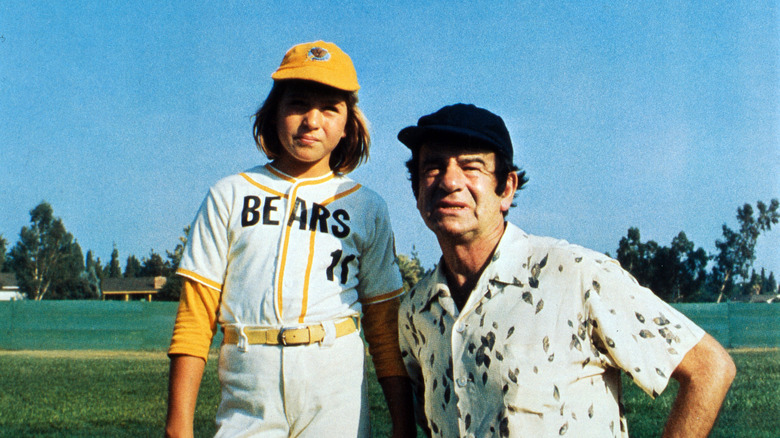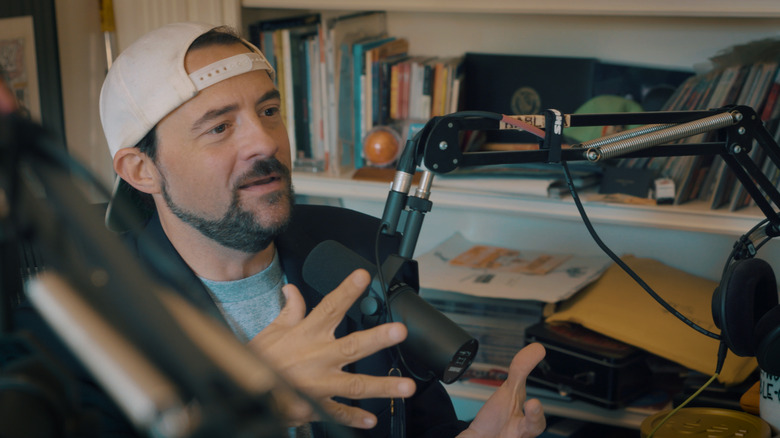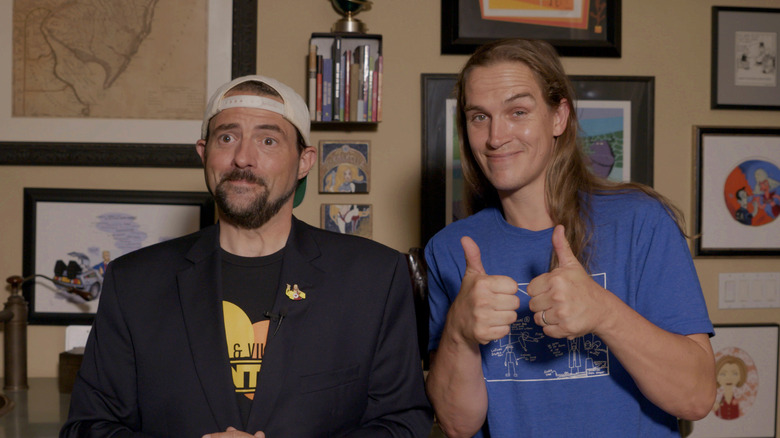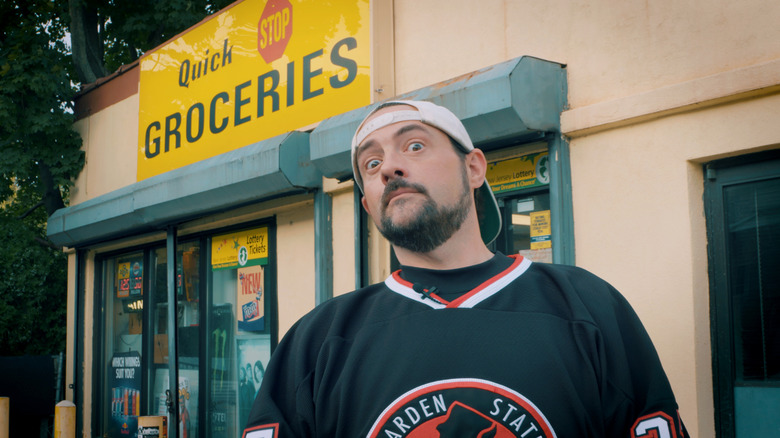'Clerk' Documentary Subject Kevin Smith Reflects On His Life And Career, Mulls Marvel And More - Exclusive Interview
There's no question that writer, director and occasional actor Kevin Smith has led an amazing life in the decades since his indie comedy sensation "Clerks" hit the big screen in 1994. Several films, including "Mallrats," "Chasing Amy," "Dogma," "Clerks II," and the "Jay and Silent Bob" adventures have followed, and often the films are based on his own life and the people and places he's encountered in his native New Jersey.
Now, just ahead of Smith's next film, "Clerks III," writer-director and longtime Smith friend Malcolm Ingram is taking a detailed look at the multi-faceted filmmaker in the aptly titled feature documentary "Clerk." New on digital video November 23, "Clerk" takes a comprehensive look into Smith's life and career in interviews with family members, friends, and frequent collaborators, including Jason Mewes, Scott Mosier, Ben Affleck, and Matt Damon. Smith's fellow filmmakers, including Jason Reitman and Richard Linklater, also weigh in, as well as Smith's wife, actor-producer Jennifer Schwalbach Smith, and their daughter, actor Harley Quinn Smith.
Naturally, Smith is also interviewed throughout "Clerk," where he reveals the inspirations behind his films, his ventures beyond the big screen, and the highs and lows of the movie business. Smith is willing to broach some of his most painful memories as a filmmaker, including the savage critical reception to "Mallrats" — his first film after "Clerks" — as well as other movies throughout his career. Smith also recounts what he describes as "dark days ... very dark days" working with Bruce Willis on the comedy "Cop Out," as well as his massive heart attack in 2018 — an event that changed the course of the esteemed filmmaker's life in positive way.
In an exclusive interview with Looper, Smith discusses "Clerk," his everlasting love of the "Clerks" franchise, his "outsider" status in Hollywood, and his surprising pick for his favorite movie of all time. Also, the one-time Marvel movie actor ("Daredevil"), Marvel Comics writer, and fan of the Marvel Cinematic Universe reveals his thoughts about whether he'd like to direct an MCU film, and much more.
Kevin Smith takes showbiz personally because of his passion for filmmaking
Congratulations on "Clerk," and right from the very beginning, with that VHS message you taped your parents and then going all the way to the other end of the story with your heart attack, as a viewer you realize this really is a very personal business for you. Your filmmaking is very personal. And I think that's the reason why you've had such of a successful career. Because whether you're creating realistic or scenarios, everything seems to be rooted in your passion for life. Would you say that's true?
Absolutely. Look, I've got no edge in this business because of natural born talent. I don't have that. I'm a pretender to the throne. You meet many filmmakers in this biz who are born, put on this Earth to manipulate media and be filmmakers. Quentin Tarantino naturally leaps to mind. I'm the other guy. I'm the guy that liked movies so much, he just aggregated into making them. And that's passion. So, you've got pure talent players, and you've got pure passion players. And passion has taken me very far, man.
Joey Adams was cleaning out a shed near her house, and she found a bunch of "Chasing Amy" stuff. And so, she was texting it to me like going, "Why wasn't this the poster?" and stuff like that, for some alternate artwork that we had. But there was one piece from Entertainment Weekly where they reviewed the movie, I think on home video, "Chasing Amy," and it was like, "He still doesn't know how to move a camera." That was then. It is the same review I get on my stuff to this day. People are still like, "He's not a natural born filmmaker." And I used to argue with [them] in the beginning of my career, but now I'm like, "You're right. Not at all." I'm an outsider artist at best.
My first film got picked up, and I got very lucky, but that meant that I had to learn my craft in front of people for the next few years. "Mallrats," "Chasing Amy," "Dogma," these are movies of a fledgling filmmakers trying to figure out how to tell stories, cinematically that aren't just single long takes and black and white at a convenience store counter. So, it's always been personal to me. And that's why I would take the criticisms personal as well, because it's not like, "Oh, they're not just going after the movie. They're going after me," because I'm so connected to the work. Not just because it's generally, always based on real stories from my life, but also because the insecurity of being an outsider artist.
He refers to Clerks every day of his life
Smith continues to discuss why he takes showbiz personally
You got to remember I'd watch movies my whole life, but never investigated being a filmmaker until I saw "Slacker" at age 21. And by 22 ... Before I was 22. By the end of my 21st year, I was already in Vancouver at film school. So, I went from film fan to would be or nascent filmmaker in the span of a year. [Steven] Spielberg, you read about he ran around with a Super 8 camera in his backyard when he was a child. I never thought about making movies. I was just a movie consumer until I saw [Richard Linklater's] "Slacker." And then I was like, "Wait a second, maybe." So, it's always been very personal with me. And I do feel like when people latch onto it and stay with me, there are some cats been with me ride or die since 1994, those cats come at it from the personal place, like where they're like, "Oh, he's my guy. Because if I had ever done what he did, I would doing it the way he does it."
Some people play you like you're their avatar, which is very flattering. In some minor cases, that blows up in your face. Because when you make a decision that they would never make, suddenly you've betrayed them. You're no longer the filmmaker they thought you were. I got a lot of that on "Jersey Girl." I made "Jersey Girl." And they're like, "What? You would've made fun of this movie 10 years ago," or stuff like that. I took heat on "Yoga Hosers." I mean, I did. I took heat on "Mallrats," too, second movie out. They liked "Clerks" so much, that when I made the second movie and I'm like, "Hey, this is what I also like to do." They were like, "Oh no." And they pulled back on the reins on that real hard. So, I've always played it so personally, and I never stopped talking about the movies.
Think about it. "Clerks" is a word that I've not stopped saying every day of my life since 1993. Chris Nolan, he don't even reference "Memento" anymore, which was an amazing film. But he makes amazing film after amazing film. My man lives in the present, if not the future. I'm the guy who's like, "Remember the '90s?" You know? I never let you forget sure where I came from. Especially because no matter what I'm doing, it's somehow connected. I say that as the guy who just finished the third iteration of a "Clerks" movie.
Smith has a surprising pick for his all-time favorite movie
Professionally speaking, going back to "Slacker," I would imagine that's your favorite film of all time, just because it really showed you your way. But as a fan, is your all-time favorite different? And what would that be?
Yeah. Look, "Slacker" is the movie I owe the most to, the one that made me see the possibility, but it was never like, "Oh, my God, I identify with the subject matter," because I didn't live like that. "Slacker" is a portrait of Austin, Texas, which is an artsy community, a big college town, not to mention the state capital, but there's a lot of diversity, a lot of culture, a lot of arts there, liberal bastion, and stuff. So that movie isn't taking ... It's not focused on a character. If there's any character, it's the city of Austin.
So, that movie, while it did open up my eyes to indie film, doesn't an appeal to me as a guy who loves dialogue, or as a guy who loves character, because that is a character study where you're with a character for two minutes. That character introduces you to another character, and then you're off to the races with that character. So, I respect the hell out of that movie. I love that movie for what it gave me and what it inspired in me. But I would never call it my favorite movie of all time. What would be my favorite movie of all time? I used to say that my top five were "Jaws," "JFK," "Do the Right Thing," "The Last Temptation of Christ," and "A Man for All Seasons." Now, I definitely watch those movies once every year, if not every other year. But would I still call them my favorites? Or is that like a stock answer that I've been giving since my 20s?
If you asked me today, what's your favorite movie? I'd be like, "Might be 'Iron Man,'" and people would be like, "What? You're not Ridley Scott." And I was like, "Nobody ever accused me of being Ridley Scott." So, I'm the filmmaker that gets away with being like, "I love all those Marvel movies — love how cookie cutter they are." That's what appeals to me about them. So, I mean, honestly, let me see. Of the ones that I mentioned, "Jaws," "JFK," "Do the Right Thing" ... Honestly, my favorite movie of all time may be "The Bad News Bears." Now, it's a bit controversial, because it hasn't aged that well. It has a lot of racism in it and vulgarity coming out of the mouths of babes. That was part of its charm in the '70s. Scrape away that stuff, and what you're left with is the movie that taught an entire generation how to lose gracefully, not even gracefully, how to lose.
The Bad News Bears prepared him for the disappointments in life
Smith continues to explain why "The Bad News Bears" is his favorite film
Movies, when I was a kid, taught us that you weren't always special. You were many times outside of the mainstream, and they give you a movie about yourself as an underdog hero, perhaps. But you don't get it all. You don't get to win. You get some friends, but you don't get to have those friends and win and stuff like that. That movie taught me how to lose gracefully. And I've had to do that again and again and again in my life, not just in my career or something like that. Not only did "The Bad News Bears" prepare me for the death of "Mallrats," the death of "Chasing Amy," the death of "Yoga Hosers," it prepared me to handle disappointment well in life.
I always felt bad for the generation that came after us, because that was the T-ball generation. That was "The Mighty Ducks" generation, where the Mighty Ducks win at the end. "Bad News Bears" — spoilers — lost. Imagine being a kid who identifies with these outsider kids, man, who are playing Little League, just like you play Little League and stuff. Maybe you don't curse your fool head off like they did, but you're identifying with a story, and then right up to, "Oh. My God, they're going to do it" and then don't let them win. It's an important generational lesson.
And I'm not saying that the next generation was poorer for "The Mighty Ducks" and the Mighty Ducks' many victories, but I don't know ... Honestly, that movie, I probably got the most out of in my life. I still use on a regular basis when it comes to the disappointment and not being able to get what you want and do exactly what you want. So many movies have taught us, "If you dream it, you can do it" and stuff. And nowadays, parents tell their kids that. But when I was a kid, our parents never said s*** like that. My father was like, "See that mountain? Never climb it. You'll fall. You'll hurt yourself. Leave it for better people."
So, having a movie like "The Bad News Bears" taught us that it was alright to lose. You can't always f****** win. That's what the movies is. They always win, except in "Empire Strikes Back," and except "Infinity War." But generally speaking, they always win and stuff. And it was important to learn a lesson where it's like, these kids, they didn't get what they want. And they didn't go home crying or anything. Yeah, they threw a trophy at them, and they drank beer. And we didn't get to do that in real life, but that's the movie part.
Smith reveals that he's leaving Marvel moviemaking up to visionaries
Now, you mentioned "Iron Man." Your resume is deep as a comic book writer with Marvel. But I've read that you're not interested in directing a Marvel Cinematic Universe project, mainly because you don't want to take yourself away from being a fan. You want to be a fan. You don't want to lose that. Is that still the case?
Yes. And more importantly is, even more than that though, is like, I'm not talented enough to do that stuff. You look at those movies, man. That takes a real visionary to pull that stuff off. And granted, I know it's team, and they got ... I've seen behind the Marvel curtain, the Marvel Cinematic Universe method. And I understand that it takes a village and there's a bunch of people, but I would be the weakest link in that village. I love those movies to death, but I never ever sit there going like, "Well, this is what I would do different" or "Oh, I wish I was making this." I always like to say the chef has to eat, too, and I'm used to preparing meals for people. And granted, they're not sustaining meals, and they're not fancy meals, but I know how to cook. I need to eat, too. And that's what I eat. I consume that stuff. And oddly enough, I don't output it. It's not like I watch a Marvel movie and go like, "I want to make a Marvel movie."
I watch a Marvel movie and I'm going to make "Clerks III." Because I see people doing what they're exceptionally good at and reminds me to go do what I consider myself to be exceptionally good at. So, I don't think I have the talent to pull that kind of thing off. I'm not visionary enough. You need somebody who's big in the visual storytelling realm. And you've got plenty of kids coming out of film school and coming out of Sundance who Marvel could scoop up, who are wanting to do that and have dreams of that.
To be fair, when I started my career back in '94, that was never in the cards. Making big action movies wasn't my thing. I just always wanted to make Kevin Smith movies, and some are more complicated than others, but they're all pretty simple. They're people talking to each other. I made my comic book movie, I feel like, with "Dogma" and with "Jay and Silent Bob Strike Back." So, for the Marvel movies, I'm content to just watch them. Same with the DC movies and "Star Wars." The big stuff that I enjoy talking about on [the podcast] "FatMan Beyond" every week or on [the podcast] "Hollywood Babble-On." Those are the movies that I enjoy ingesting, but I would never try to make one in a million years.
He doesn't intend to change his methods despite the cultural climate
Your first big taste of people protesting your movies came with "Dogma," and I love how you pointed out in the documentary how people were protesting who hadn't even seen the movie. That seems to be the case today, where people are hypersensitive about everything and don't even see what they are protesting. Has that changed your sensibilities as a filmmaker? Because again, we're always going to have that segment of society who complain, and probably it seems a lot bigger now with social media. Has that made you a little gun shy with the way you proceed with your filmmaking now?
Not so much, because I don't really trade in characters where people have that much of an emotional investment or a pop culture investment. If I was making a "Batman" movie, that sets me up for disappointing others, because they're like, "I know what 'Batman' is like, and you better give me the Batman that I'm used to." And maybe I don't, and that lets them down. When it comes to my characters, I can't be wrong. I created my characters. Those characters are part of me, and they grow with me.
So, I never feel like, "Ooh, are they going to come after me for making this choice?" I'm like, "They can't, I'm the guy that created this stuff." It's not like I'm picking up somebody else's characters, somebody else's intellectual property and having my way with them. I'm like, "These are my kids." These are my characters. And until I leave this world, I'm the guy in charge of their storytelling. And I don't make movies where people are like, "We need nine sequels." I made "Clerks III" because I wanted to, not because the world was asking for it. So, because of that, not so much.
And in terms of worrying about the culture or worrying about, can one be funny? Or something like that, I've never been a ... I've never punched down so to speak. I've always punched myself. Most of my jokes are at my own expense or the expense of my characters who are reflections of me. So, there was really no like, "Well, I can't do that anymore," because I could beat the s*** out of Kevin Smith all day long. Ain't nobody going to complain about it except maybe Kevin Smith. So even there, I feel like I'm kind of okay.
Smith doesn't expect any sort of protesting of Clerk
Smith continues on about not changing his approach to comedy
With something like "Clerk," it's kind of critic proof, in as much like it's a story of a guy's life. You can't argue with it. It happened. I just finished the third iteration of "Clerks" — "Clerks III." There's a chance that I could disappoint somebody, even though I'm sitting here going, "I'm the arbiter of all things 'Clerks.'" At a certain point, the audience is like, "Well, I've been on the ride for just as long. And I'll tell you whether or not you did your job correctly." So, there's that aspect of it as well. But I don't shape for the audience. I never did, and it would feel weird to start it at this point in my career.
I feel like the reason I got an audience is because they're like, "All right, we want to hear exactly what you have to say, good or bad." And hopefully, most of the time, they find it into are staying or entertaining. And hopefully, they'll suffer through the bad ones until another good one comes down the pike so to speak. But yeah, it hasn't changed the way I've done much at all.
Plus, you learned the most valuable lesson, and that is to never ever cast Bruce Willis again.
Oh, my God. If I die and there is a heaven and I stand before my maker and the maker is just like, "What'd you learn this time around?" That's for sure what I'm throwing out there. And I think he might be like (motion his hand in a welcoming manner), "Come in. ["Die Hard" director John] McTiernan is in here, too. Come on in." [Laughs]
"Clerk" debuts on digital on November 23.
